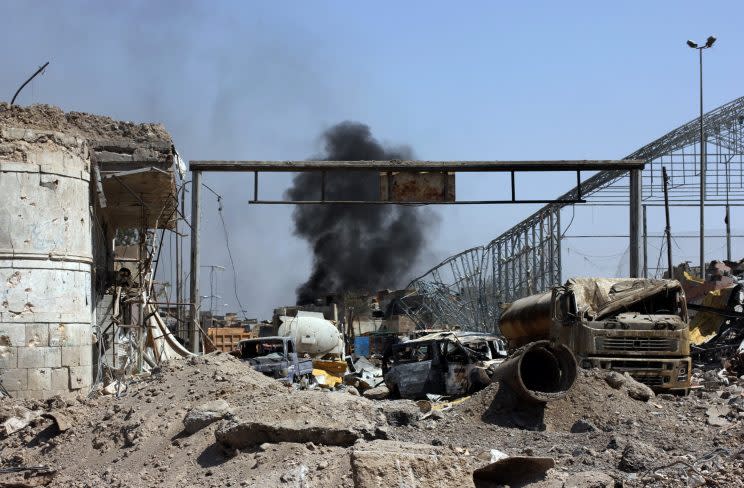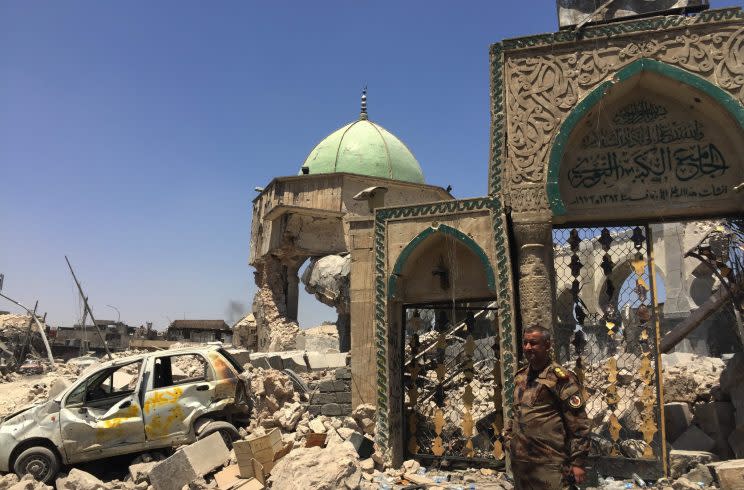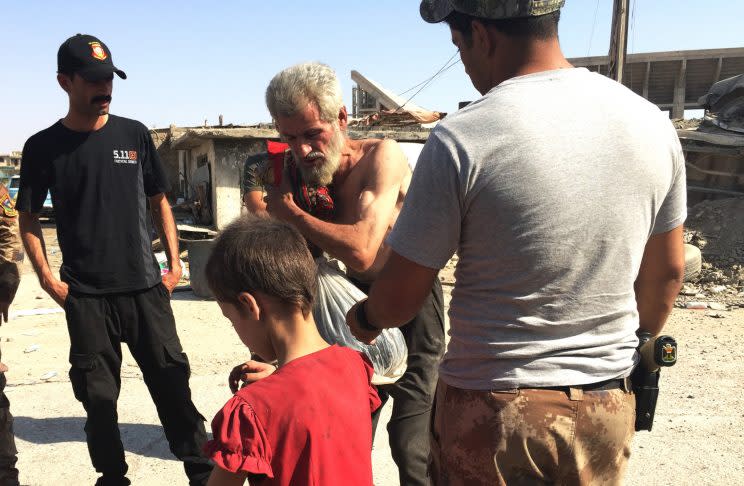ISIS, driven out of Mosul, leaves behind a city in ruins and a society shattered by distrust
MOSUL, Iraq — Proclaiming victory over the Islamic State in Mosul, Iraqi Prime Minister Haider al-Abadi went to the city Sunday and Monday to congratulate Iraqi forces for their battle “victories” and accomplishing their mission in West Mosul, calling them “heroic.” He described Mosul as “liberated,” and his presence was meant to invoke a sense of freedom, a declaration that Mosul was rid of the violent occupation.
While he was congratulating the Federal Police outside Mosul’s Old City on Sunday, inside it, there was an airstrike around 100 meters away near the site of the Great Mosque of al-Nuri. The mosque, where Abu Bakr al-Baghdadi declared the rise of an ISIS caliphate in 2014, was blown up nearly two weeks ago.
The aircraft could be heard overhead. Suddenly there was a swish sound in the sky, and then a loud bang. Plumes of smoke rose over the Old City neighborhood and evaporated into the air.
The Iraqi Special Forces and counter terrorism battalions fought ISIS every day for nine months, battling snipers, suicide bombers and mortar attacks. They say a few may still be hiding in the heavily damaged city.
On the front line, one commander who did not give his name sat on a bed listening to his men over a radio. They called out their positions, and then when they killed an ISIS fighter, they’d say, “Victory is ours.” But the joyous moment was gone when another soldier reported one their own was shot dead.

At another corner of the Old City’s narrow streets, ISIS snipers exchanged fire with Iraqi forces. A soldier injured in the chest and leg was rushed on a stretcher to an ambulance. Journalists were asked not to photograph him; soldiers make efforts not to show any weakness.
The Iraqi forces have been fighting hard to recapture Mosul in an offensive that began last October. They started on the eastern side of the city and took that section in 100 days. Retaking the densely populated western part with its narrow streets has been slower.
—
Mosul, the second largest city in Iraq, was an ISIS stronghold. The city has a rich history dating back to the beginnings of recorded civilization, the site of struggles among empires and religions.
In June 2014, a suicide bomber struck in the city, followed the next day by convoys of ISIS fighters who drove out the Iraqi government forces and imposed their strict rule on the population of some 3 million. Curfews were enforced; members of opposing forces trapped in the city were hanged; oil refineries were confiscated. Many civilians fled.
Sunni and Shia branches of Islam have long been in conflict, which played out in violent clashes in Iraq in 2006. ISIS grew out of the Sunni branch. Under its rule, Shia Muslims and members of other religions who did not convert risked imprisonment or even death.
—
The operation to retake Mosul has been a success, but it has come at a heavy price of destruction and the displacement of hundreds of thousands of civilians, especially from West Mosul. At the start of the operation, Iraqi government forces encouraged civilians to stay in their homes, to raise white flags or to even help fight ISIS. But as the violence increased and ISIS resorted to tactics such as suicide and car bombings, the government switched its approach and created safe corridors to get as many people out as possible. Among the houses that had been bombed into rubble, the booby traps and IEDs in the streets, civilians trying to escape risked being shot by snipers if they were seen.
And amid growing concern that ISIS may have left behind sleeper cells or disguised its fighters among the innocent civilians, Iraqi troops have had to impose more rigorous screening of the massive waves of displaced people on the move in and out of Mosul.

Soldiers told Yahoo News that some of the civilians escaping were turning in their own family members — pointing to brothers, husbands, children or cousins as fighters for ISIS.
Near the base that hosts one of Iraq’s counterterrorism units, a flood of displaced people came around a small hill that leads to the Old City. People fleeing from the fight, mostly women and children, made their way toward security forces, who questioned them and checked them for hidden explosives.
Two women approached with toddlers who had light-colored eyes and whose pale skin didn’t match their mother’s complexion. They looked eastern European, and the Iraqi soldiers demanded to know who their mothers really were. They women said they were. The soldiers asked about the identity of the fathers. The women didn’t answer. Since they appeared to be unarmed, the Iraqi soldiers let them pass. But they made comments about Iraqi children getting lighter and sneered about ISIS having brought in foreign fighters – likely from Russia or former Soviet Union countries that have a majority Muslim population.
The men who came down the hill stripped to the waist to show they did not have bombs strapped to their chests.
Most of the displaced only had the clothes on their backs and showed signs of dehydration and malnutrition. Their faces were filled with both relief and fear. One woman cried her children were “dying of hunger” and that “God would get revenge” on ISIS for what they did to her family.

—-
But on a day when Prime Minister Abadi was seeking to encourage his people, his declaration of victory after the long battle provided some hope and relief. After his praise of the Federal Police, celebrations broke out in the streets, children danced with Iraqi flags, women created hijabs from Iraqi flags out of pride and soldiers in armored vehicles took selfies with their friends.
For the Special Forces, the fight against ISIS in Iraqi is not over, and certainly, Mosul will not be totally safe again for a long time. ISIS has not been eradicated. It still has a strong hold in cities like Tal Afar, Hawija, and there have been incidents of violence in the province of Kirkuk.
The soldiers will have to fight again another day. There are still ISIS fighters in Tal Afar, Hawija and other places in Iraq. But they have pushed hard in the battle against a determined enemy who used civilians as human shields.
For those who survived the long occupation, it will be years before they are able to say the fight is over. They now face steep challenges in rebuilding their homes, or finding work in a shattered economy, or living with their faith and hoping to preserve the memory of the prosperous city they once called home.
_____
Ash Gallagher is a journalist covering the Mideast for Yahoo News.
Read more from Yahoo News:
Violent protests break out at G-20 summit in Hamburg, Germany
‘Get a grip man’: Clinton campaign chair Podesta fires back at Trump
Arizona is asking: Where does Jeff Flake stand on health care?
Nevada Sen. Heller is vulnerable, and first-term congresswoman Jacky Rosen wants to take him on
Photos: Endgame in Mosul: Iraqi forces storm the Islamic State-held Old City


